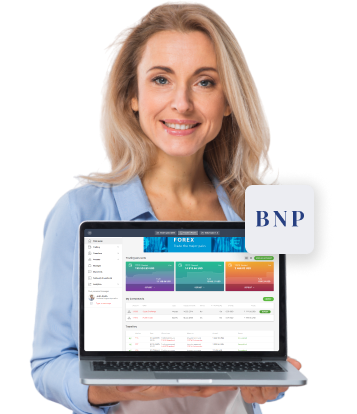An obligatory condition for trading on the Forex market is cooperation with a brokerage company. This is due to the fact that according to the law of our country, a private person has no right to trade on the exchange without an intermediary.
Forex broker is a special company that performs the function of intermediation between a trader and the currency exchange. It is also called a dealing center, which provides access to various financial instruments and analytics. In addition, with the help of a team of specialists, it helps to properly execute all the documents necessary for the conclusion of transactions.
A forex broker connects the market and the trader. With the help of leverage, it provides traders with the opportunity to speculate on currency market movements.
Today, a forex broker is more than just a broker who provides access to the foreign exchange market. Its role has expanded with the emergence of completely new markets and their growing popularity.
A single trading account allows a retail trader (individual) to trade gold, oil or even cryptocurrency markets. This increases the number of strategies that can be used from the same account and gives the opportunity to diversify the account according to market movements.
Forex broker's working principle
A dealing center opens access to the market with the help of a special platform. With its help, a trader is able to use a wide range of tools and technical indicators, perform financial transactions and monitor changes in asset prices. The trader has the opportunity to receive up-to-date information about all quotes. Thus, the risks of purchasing illiquid assets are reduced. The broker also gives an opportunity to use leverage and trade with amounts exceeding the client's deposit dozens or even hundreds of times.
What does a forex broker get money from?
Obviously, a brokerage organization is not a charity and requires material incentives for its services. The main source of its profit is the commission.
In exchange for fulfilling your orders to buy or sell a currency, the broker charges a commission or spread. Commission is a certain amount deducted from each transaction, the amount of commission usually depends on the volume of the transaction. Spread is the difference between the buying and selling price of a currency (Bid and Ask). When you open any position, you are immediately at a loss by the amount of the spread, and the forex broker makes a profit. Regardless of the profit or loss you get on the deal, the broker has already taken his profit in the amount of the spread. The spread can be either fixed or floating. A floating spread widens at high volatility or at the release of certain news and narrows at a calm, stable market.
Forex Broker Accounts
Depending on how a Forex broker is organized, there are different types of trading accounts, and different trading conditions corresponding to them.
For example, some brokers are organized as market makers or so-called Dealing Desks. They mirror the real market and offer traders similar conditions through a trading platform. In essence, the trader deals directly only with the broker: positions are not taken to the market. In this case, it is likely that this type of broker offers an account with fixed spreads and charges a commission.
Other brokers forward all or only some of their clients' orders to the liquidity providers they work with. If all trades are routed through liquidity providers, the brokerage company operates according to the No Dealing Desk principle. If some trades are routed to liquidity providers and the rest are handled internally, the brokerage's operating model is hybrid.
Obviously, the more liquidity providers work with the broker, the better trading conditions it can offer to the client - narrow spreads, low commissions, several types of trading accounts.
Trading accounts also differ depending on the broker's business model. For example, brokers operating on the No Dealing Desk principle use ECN and/or STP technology.
In this case, the broker offers floating spreads, which change depending on market conditions - they narrow when market volatility is insignificant or absent, and widen with the release of important economic news, or in case of low liquidity or its absence for example, during the transfer of a position from one day to another. A significant advantage is that the broker guarantees execution when there is a market (quotes are flowing), and does not send requotes to the terminal with a refusal to execute.




